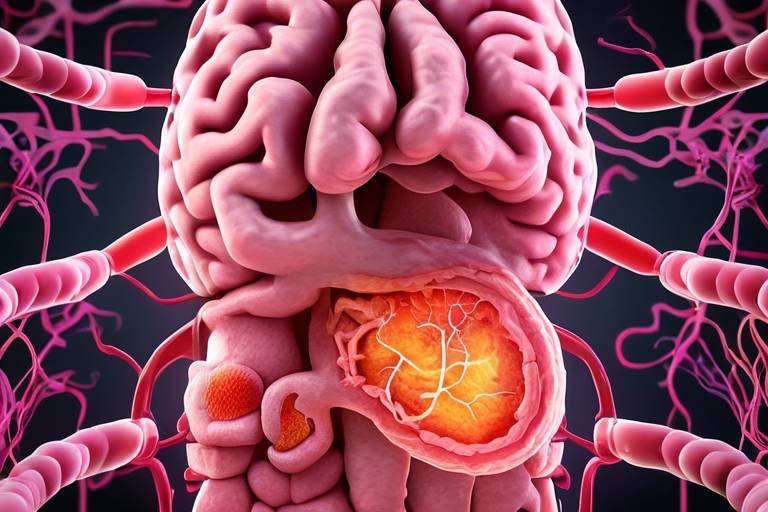The Science Behind the Gut-Brain Connection - New Insights
Have you ever felt "butterflies" in your stomach before a big presentation or noticed how your mood shifts after a heavy meal? These sensations are more than just metaphors; they illustrate the profound and intricate relationship between our gut and brain. Recent scientific research has unveiled a fascinating network known as the gut-brain axis, which serves as a communication pathway linking our gastrointestinal system with our central nervous system. This connection is not just a one-way street; it involves a dynamic interplay of signals that can significantly influence our mental well-being and cognitive functions.
The gut is often referred to as the "second brain," and for good reason. It houses trillions of microorganisms collectively known as the gut microbiota, which play a pivotal role in not just digestion but also in regulating our emotions and mental health. Imagine your gut as a bustling city, where various bacteria are like citizens contributing to the overall health and happiness of the community. When this community is diverse and thriving, it can positively impact your mood and cognitive abilities. However, when it becomes unbalanced, the repercussions can be detrimental, leading to issues such as anxiety and depression.
As we delve deeper into the science behind this connection, it becomes clear that what we eat can dramatically influence our gut microbiota. A diet rich in fiber and fermented foods acts like a nutrient-rich fertilizer for our gut bacteria, fostering a healthy environment that promotes mental clarity and emotional stability. On the other hand, a diet high in processed foods can lead to dysbiosis, a state where the gut microbiota becomes unbalanced, potentially triggering a cascade of health issues.
Moreover, the gut microbiota is intricately involved in the production of neurotransmitters, such as serotonin, which is often dubbed the "feel-good" hormone. In fact, it’s estimated that about 90% of serotonin is produced in the gut! This underscores the importance of maintaining a healthy gut to ensure optimal mental health. Just think of it as a factory where the raw materials (your food) are transformed into products (neurotransmitters) that influence your mood and emotional state.
However, it's crucial to recognize that the relationship between the gut and brain is not solely about what we consume. Stress can have a profound impact on gut health, leading to a vicious cycle where poor gut health exacerbates mental health issues, and vice versa. Stress can disrupt the delicate balance of gut microbiota, resulting in gastrointestinal problems that can further affect our mood. Therefore, managing stress through techniques like mindfulness and yoga can be incredibly beneficial, not just for our mental state but also for our gut health.
As we continue to explore this exciting field, ongoing research aims to uncover the complexities of the gut-brain connection. The potential implications are vast, possibly paving the way for new therapeutic approaches to treat mental health disorders. Imagine a future where we can improve mental health by simply focusing on gut health!
- What is the gut-brain axis? The gut-brain axis is a complex communication network linking the gastrointestinal system and the brain, involving biochemical signaling between the gut microbiota and the central nervous system.
- How does gut health affect mental health? A healthy gut microbiota can positively influence mood and cognitive function, while an imbalanced gut can lead to anxiety and depression.
- What role do probiotics play? Probiotics are live microorganisms that can improve gut health and may help alleviate symptoms of anxiety and depression.
- Can diet influence gut health? Yes, a diet rich in fiber and fermented foods promotes a healthier gut microbiota, which is linked to better mental health.
- How does stress impact the gut? Stress can disrupt gut health, leading to dysbiosis and gastrointestinal issues, which can exacerbate mental health problems.

Understanding the Gut-Brain Axis
The gut-brain axis is more than just a fancy term; it's a fascinating communication highway that links your gastrointestinal system with your brain. Imagine it as a two-way street where signals are constantly being exchanged, shaping not only how we digest food but also how we feel emotionally and mentally. This intricate network involves a variety of biochemical pathways, and at the heart of it all are the gut microbiota—those trillions of microorganisms living in our intestines.
So, how does this work? Well, think of your gut as a bustling city, where various neighborhoods (microbiota) communicate with the central hub (the brain) through a series of highways (nerves and hormones). When the gut is healthy, it sends positive signals to the brain, promoting feelings of well-being. Conversely, when the gut is out of sync—perhaps due to poor diet or stress—it can send distress signals that might lead to feelings of anxiety or depression.
Research has shown that this gut-brain communication occurs through several mechanisms, including:
- Neurotransmitter Production: The gut microbiota produces essential neurotransmitters like serotonin, which is crucial for mood regulation.
- Immune System Interaction: The gut also plays a significant role in immune response, impacting inflammation levels that can affect brain function.
- Vagus Nerve Pathway: This is a direct nerve connection that allows signals to travel swiftly between the gut and the brain.
Understanding the gut-brain axis is crucial because it opens up new avenues for addressing mental health issues. By focusing on improving gut health through diet, probiotics, and lifestyle changes, we may be able to enhance our mental well-being. It’s like tuning an instrument; when all the strings are in harmony, the music (or in this case, our mental state) sounds much better.
Furthermore, researchers are exploring how this connection can be leveraged for therapeutic purposes. For instance, could a simple change in diet or the introduction of specific probiotics lead to significant improvements in mental health? The possibilities are exciting and point to a future where mental health treatments could be as straightforward as a dietary adjustment.
In summary, the gut-brain axis represents a complex yet vital relationship that underscores the importance of gut health in overall well-being. As we continue to learn more about this connection, it becomes clearer that taking care of our gut is not just about physical health—it's a crucial aspect of nurturing our mental health too.

The Role of Gut Microbiota
The gut microbiota, often referred to as the body's "second brain," plays an astonishingly crucial role in regulating various physiological processes that extend far beyond digestion. It comprises trillions of microorganisms, including bacteria, viruses, fungi, and other microbes that reside in our gastrointestinal tract. These tiny inhabitants are not mere passengers; they actively engage in biochemical signaling that can influence our overall health, including our mental well-being. Imagine your gut as a bustling city, with each microbe playing a specific role in maintaining order and harmony. When this city thrives, so does the entire body.
Research has shown that a healthy gut microbiota is essential for a variety of bodily functions. Here are some of the key roles it plays:
- Digestion: Gut microbiota helps break down complex carbohydrates and fibers that our bodies cannot digest on their own, leading to the production of short-chain fatty acids (SCFAs) that are vital for gut health.
- Immune Response: A significant portion of our immune system resides in the gut. The microbiota educates and modulates immune cells, helping to protect against pathogens while preventing autoimmune reactions.
- Mood Regulation: The gut microbiota is involved in the synthesis of neurotransmitters, such as serotonin, which directly influence mood and emotional states.
Moreover, the composition of gut microbiota can vary significantly from person to person, influenced by factors such as diet, age, and lifestyle. This diversity is not just a matter of variety; it is a key indicator of health. Studies suggest that a more diverse microbiome is associated with better mental health outcomes. Think of it as a diverse ecosystem: the more varied the species, the more resilient the environment. Conversely, a lack of diversity can lead to dysbiosis, a condition that has been linked to increased risks of anxiety, depression, and other mental health disorders.
Furthermore, the gut microbiota interacts with the gut-brain axis, sending signals that can affect brain function and behavior. For example, certain strains of probiotics have been shown to enhance cognitive functions and reduce symptoms of anxiety and depression. This connection highlights the importance of maintaining a healthy gut microbiome, not just for physical health, but also for mental clarity and emotional stability.
As we delve deeper into the science of gut microbiota, it becomes clear that nurturing our gut health is not just about avoiding digestive issues; it's about fostering a holistic state of well-being. Incorporating a diet rich in fermented foods, fiber, and probiotics can significantly enhance the diversity and functionality of our gut microbiota, paving the way for improved mental health and cognitive performance.
In summary, the role of gut microbiota in our health is profound and multifaceted. By understanding and optimizing this complex ecosystem, we can unlock new avenues for enhancing our overall well-being, bridging the gap between gut health and mental clarity.
Q1: What are probiotics, and how do they benefit gut health?
A1: Probiotics are live microorganisms that, when consumed in adequate amounts, confer health benefits to the host. They help restore the natural balance of gut bacteria, improve digestion, and may alleviate symptoms of anxiety and depression.
Q2: How can I improve my gut microbiota?
A2: You can improve your gut microbiota by consuming a diet rich in fiber, fermented foods (like yogurt, sauerkraut, and kimchi), and prebiotics (found in foods like garlic, onions, and bananas). Staying hydrated and reducing stress can also positively impact gut health.
Q3: Can gut health affect my mood?
A3: Yes! The gut microbiota plays a significant role in producing neurotransmitters like serotonin, which are crucial for mood regulation. A healthy gut can lead to better emotional well-being.

Microbiome Diversity and Mental Health
The relationship between microbiome diversity and mental health is a fascinating area of research that continues to unfold. Imagine your gut as a bustling city, where each type of bacteria represents a unique neighborhood contributing to the overall harmony of the metropolis. Just like a city thrives on diversity—different cultures, languages, and ideas—our gut also requires a diverse array of microorganisms to function optimally. Recent studies have shown that a more diverse microbiome is linked to improved mental health outcomes, suggesting that the variety of gut bacteria can significantly influence our mood and cognitive functions.
Research indicates that individuals with a rich and varied gut microbiota tend to experience lower levels of anxiety and depression. This correlation raises an intriguing question: could enhancing the diversity of our gut bacteria be a key to better mental health? The answer appears to be yes, as scientists have found that specific bacterial strains can produce neurotransmitters, like serotonin, which are crucial for regulating mood. In fact, it’s estimated that about 90% of serotonin is produced in the gut, emphasizing the importance of maintaining a healthy microbiome.
But how do we achieve this diversity? The answer lies in our diet. Foods that are high in fiber, such as fruits, vegetables, and whole grains, act as prebiotics, feeding the beneficial bacteria in our gut. Additionally, fermented foods like yogurt, kimchi, and sauerkraut introduce new strains of bacteria, further enhancing microbiome diversity. By incorporating these foods into our daily meals, we can nurture our gut health, which may, in turn, support our mental well-being.
Furthermore, it’s essential to recognize that lifestyle factors also play a significant role in shaping our microbiome. Regular physical activity, adequate sleep, and stress management are all critical components that contribute to a healthy gut. When we prioritize these aspects of our lives, we not only foster a diverse microbiome but also create a solid foundation for mental resilience.
In conclusion, nurturing a diverse microbiome is akin to cultivating a vibrant garden within our bodies. By planting the seeds of healthy habits, we can foster a flourishing ecosystem that supports both our physical and mental health. As we continue to explore this intricate relationship, one thing becomes clear: taking care of our gut is not just about digestion; it’s about nurturing our very essence of well-being.
- What is microbiome diversity? Microbiome diversity refers to the variety of microorganisms present in the gut, which can influence overall health and well-being.
- How does diet affect microbiome diversity? A diet rich in fiber and fermented foods promotes the growth of beneficial bacteria, enhancing microbiome diversity.
- Can improving gut health alleviate mental health issues? Yes, research suggests that a healthier gut microbiome can positively impact mood and cognitive functions, potentially alleviating symptoms of anxiety and depression.
- What lifestyle changes can improve gut health? Regular exercise, adequate sleep, stress management, and a balanced diet can all contribute to a healthier gut microbiome.

Probiotics and Their Benefits
Probiotics are often hailed as the superheroes of gut health, and for good reason! These live microorganisms, primarily found in fermented foods and supplements, can significantly enhance our overall well-being. Imagine your gut as a bustling city, where probiotics act as the friendly citizens that help maintain order and harmony amidst the chaos. They play a crucial role in balancing the gut microbiota, which is essential for optimal digestion and nutrient absorption.
But the benefits of probiotics extend far beyond just gut health. Recent studies have shown that they can also influence our mental health, acting as a bridge between our digestive system and brain. It’s fascinating to think that what we consume can impact our mood and cognitive function! Probiotics may help reduce symptoms of anxiety and depression by producing neurotransmitters, such as serotonin, right in the gut. This intricate connection highlights the importance of maintaining a healthy gut flora.
Here are some of the key benefits of incorporating probiotics into your diet:
- Improved Digestion: Probiotics can help alleviate common digestive issues such as bloating, gas, and constipation by promoting a healthy balance of gut bacteria.
- Enhanced Immune Function: A well-balanced gut microbiome supports the immune system, making it easier for your body to fend off illnesses.
- Mood Regulation: By influencing neurotransmitter production, probiotics can help improve mood and reduce feelings of anxiety.
- Potential Weight Management: Some studies suggest that probiotics may assist in weight loss by influencing appetite-regulating hormones and fat storage.
When it comes to sources of probiotics, you have plenty of delicious options! Foods like yogurt, kefir, sauerkraut, kimchi, and kombucha are all packed with these beneficial bacteria. If you’re considering supplementation, it’s essential to choose high-quality products with specific strains that have been shown to provide health benefits. Remember, not all probiotics are created equal, so it’s wise to do a little research or consult with a healthcare professional to find the right fit for you.
In summary, probiotics are a vital component of maintaining a healthy gut and, by extension, a happy mind. By incorporating these friendly bacteria into your daily routine, you’re not just taking care of your digestive health; you’re also nurturing your mental well-being. So, why not start today? After all, a healthy gut is the foundation of a healthy life!
1. What are probiotics?
Probiotics are live microorganisms that provide health benefits when consumed, particularly for gut health.
2. How do probiotics improve mental health?
Probiotics can influence the production of neurotransmitters in the gut, which play a crucial role in mood regulation.
3. What foods are high in probiotics?
Foods like yogurt, kefir, sauerkraut, kimchi, and kombucha are excellent sources of probiotics.
4. Can I take probiotic supplements?
Yes, but it's important to choose high-quality supplements with specific strains that have been studied for their health benefits.

Dietary Influence on Gut Microbiota
The foods we consume play a significant role in shaping our gut microbiota, which is a complex community of microorganisms residing in our intestines. Think of your gut as a bustling city, where different neighborhoods are populated by various types of bacteria. Just like a city thrives on diversity, our gut benefits from a wide range of microbial inhabitants. A diet rich in fiber and fermented foods acts like a gardener, nurturing this microbial garden and promoting a healthy ecosystem.
When we indulge in a diet high in processed foods and sugars, it’s akin to neglecting that garden, allowing weeds to take over and diminishing the beneficial plants. This imbalance, known as dysbiosis, can lead to various health issues, including digestive problems and even mood disorders. So, what should we include in our diets to foster a thriving gut microbiome? Here are some key components:
- Fruits and Vegetables: These are rich in fiber and essential nutrients, providing the necessary fuel for beneficial bacteria.
- Whole Grains: Foods like oats, quinoa, and brown rice are excellent sources of prebiotics, which help support the growth of good bacteria.
- Fermented Foods: Items such as yogurt, kefir, sauerkraut, and kimchi are packed with probiotics, the friendly bacteria that can enhance gut health.
- Nuts and Seeds: These not only provide healthy fats but also contain fiber that feeds our gut microbiota.
By incorporating these foods into your daily meals, you can create a more diverse and resilient gut microbiome. Imagine your gut as a diverse orchestra, where each type of bacteria plays its unique instrument. When all instruments are in harmony, the music of health resonates throughout your body, enhancing not just digestion but also mental well-being.
Moreover, the connection between diet and gut health is supported by numerous studies. Research has shown that individuals who consume a Mediterranean diet, rich in fruits, vegetables, fish, and healthy fats, often exhibit a more diverse microbiome compared to those on a Western diet. This diversity is crucial as it not only aids in digestion but also plays a role in immune function and mental health regulation.
In summary, the dietary choices we make can significantly influence the composition of our gut microbiota. By opting for a balanced diet filled with nutrient-dense foods, we can cultivate a healthier gut environment that supports both our physical and mental health. So, the next time you sit down for a meal, remember that you are not just feeding yourself; you are nurturing an entire ecosystem within you!

Neurotransmitter Production
Did you know that your gut is not just a digestive powerhouse but also a significant player in the production of neurotransmitters? That's right! The gut microbiota, which consists of trillions of microorganisms, is involved in synthesizing key neurotransmitters that are essential for our mental health. One of the most notable neurotransmitters produced in the gut is serotonin, often dubbed the "feel-good" hormone. In fact, approximately 90% of the body's serotonin is made in the gastrointestinal tract. This fascinating fact highlights the profound connection between gut health and mood regulation.
But how does this process actually work? The gut microbiota interacts with the cells in the gut lining, which in turn communicates with the brain via the vagus nerve. This intricate signaling pathway allows the gut to influence emotional states and cognitive functions. When the gut microbiota is balanced and healthy, it can lead to optimal neurotransmitter production, promoting feelings of happiness and well-being. Conversely, an imbalanced microbiome can result in reduced serotonin levels, potentially leading to issues such as anxiety and depression.
Moreover, other neurotransmitters like dopamine and gamma-aminobutyric acid (GABA) are also produced in the gut. Dopamine is crucial for motivation and reward, while GABA acts as a calming neurotransmitter that helps reduce anxiety. The production of these neurotransmitters is influenced by the types of foods we consume. For instance, diets rich in prebiotics—which feed the beneficial bacteria in our gut—can enhance the production of these mood-regulating neurotransmitters.
To illustrate the impact of gut health on neurotransmitter production, consider the following table:
| Neurotransmitter | Primary Function | Gut Source |
|---|---|---|
| Serotonin | Mood regulation, sleep, appetite | Produced in the gut |
| Dopamine | Motivation, pleasure, reward | Produced in the gut |
| GABA | Calming effects, reduces anxiety | Produced in the gut |
In conclusion, the production of neurotransmitters in the gut is a vital component of our mental health. By maintaining a healthy gut microbiome through a balanced diet, rich in fiber and fermented foods, we can enhance our body’s ability to produce these crucial neurotransmitters. So, the next time you think about your gut, remember that it’s not just about digestion; it’s about your mood and mental well-being too!
- How does gut health affect mental health?
The gut microbiota produces neurotransmitters that influence mood and emotional well-being, creating a direct link between gut health and mental health. - What foods promote a healthy gut microbiome?
Foods rich in fiber, prebiotics, and probiotics, such as fruits, vegetables, yogurt, and fermented foods, can support a healthy gut microbiome. - Can stress impact my gut health?
Yes, stress can lead to dysbiosis, which is an imbalance in the gut microbiota, potentially worsening both gut and mental health.

Impact of Stress on the Gut
Stress is a sneaky little gremlin that can wreak havoc on our bodies, and one of its favorite targets is our gut. When life throws us curveballs—whether it's a demanding job, relationship troubles, or just the everyday hustle and bustle—our bodies respond with a stress reaction that can lead to a cascade of negative effects. Imagine your gut as a delicate ecosystem, where every little change can tip the balance, and stress is like a storm that disrupts everything. When we're stressed, the body releases hormones like cortisol, which can alter gut motility, leading to issues like diarrhea, constipation, or even bloating.
This disruption doesn’t just stop at physical symptoms; it also affects the community of microbes living in our intestines. Under stress, the gut microbiota can become unbalanced, a condition known as dysbiosis. This imbalance can lead to an overgrowth of harmful bacteria and a decrease in beneficial ones, creating a perfect storm for gastrointestinal issues. The gut-brain axis, which is the communication pathway between our gut and brain, becomes compromised, leading to a feedback loop where poor gut health can exacerbate feelings of anxiety and depression.
Moreover, chronic stress can increase the permeability of the gut lining, often referred to as "leaky gut." This condition allows toxins and bacteria to pass into the bloodstream, triggering inflammation and further complicating mental health. It’s like leaving the back door open in a storm—everything gets soaked, and the damage can be extensive. The connection between our gut and brain means that a stressed gut can lead to a stressed mind, creating a vicious cycle that is hard to break.
So, what can we do about it? First, it's essential to recognize the signs of stress and address them before they spiral out of control. Incorporating stress management techniques can be beneficial not only for our mental health but also for our gut health. Here are some effective strategies:
- Mindfulness and Meditation: Taking a few moments each day to practice mindfulness can help calm the mind and reduce stress.
- Regular Exercise: Physical activity is a fantastic way to release endorphins, which can improve mood and reduce anxiety.
- Healthy Eating: A balanced diet rich in whole foods, fiber, and probiotics can help maintain a healthy gut microbiota.
By understanding the impact of stress on our gut, we can take proactive steps to protect our health. It’s all about nurturing that ecosystem within us and ensuring that our gut is a happy and healthy place. After all, a healthy gut can lead to a healthier mind!
Q1: How does stress affect gut health?
Stress can lead to dysbiosis, increase gut permeability, and cause gastrointestinal issues such as bloating and irregular bowel movements.
Q2: What are some signs of a stressed gut?
Signs include bloating, gas, diarrhea, constipation, and increased food intolerances, often accompanied by mental health symptoms like anxiety and depression.
Q3: Can improving gut health help reduce stress?
Yes! A balanced gut microbiota can positively influence mood and cognitive functions, helping to break the cycle of stress and gut issues.
Q4: What lifestyle changes can improve gut health?
Incorporating a balanced diet, regular exercise, and stress management techniques like mindfulness can significantly improve gut health.

Stress Management Techniques
Stress management is more than just a buzzword; it's a crucial aspect of maintaining both mental and gut health. When we experience stress, our bodies react in ways that can disrupt the delicate balance of our gut microbiota. This disruption can lead to a cascade of negative effects, including anxiety, depression, and gastrointestinal issues. So, how can we effectively manage stress to protect our gut and improve our overall well-being? Let's dive into some practical techniques that can make a significant difference.
One of the most effective ways to manage stress is through mindfulness meditation. This practice encourages us to focus on the present moment and cultivate a sense of awareness. By setting aside just a few minutes each day to practice mindfulness, whether through deep breathing exercises or guided meditation, we can significantly reduce stress levels. Research has shown that mindfulness can enhance our gut health by promoting a more balanced microbiome.
Another technique worth exploring is yoga. This ancient practice combines physical postures, breathing exercises, and meditation to create a holistic approach to stress relief. Yoga not only helps in reducing cortisol levels—the hormone associated with stress—but also improves gut function. The gentle movements and stretches can stimulate digestion and promote better gut health. Imagine your gut as a garden; just like plants need care, your gut needs nurturing through practices like yoga.
Incorporating regular physical activity into your routine can also be a game changer. Exercise releases endorphins, the body's natural feel-good chemicals, which can help combat stress. Whether it's a brisk walk, dancing, or hitting the gym, finding an activity you enjoy can make all the difference. Plus, studies suggest that physical activity can enhance the diversity of gut microbiota, leading to improved mood and cognitive function.
Lastly, don't underestimate the power of a balanced diet. What we eat directly impacts our gut health, and in turn, our mental well-being. Foods rich in omega-3 fatty acids, such as salmon and walnuts, as well as probiotics found in yogurt and fermented foods, can help maintain a healthy gut. A diet high in fiber can also support gut health by promoting the growth of beneficial bacteria. Think of your gut as a thriving ecosystem; feeding it the right nutrients can help it flourish.
In conclusion, managing stress is not just about feeling better in the moment; it’s about cultivating a lifestyle that promotes long-term health for both your mind and gut. By adopting techniques like mindfulness, yoga, regular exercise, and a balanced diet, you can create a harmonious relationship between your gut and brain. Remember, it's a journey, and every small step you take can lead to significant improvements in your overall well-being.
- How does stress affect gut health? Stress can lead to an imbalance in gut bacteria, resulting in digestive issues and negatively impacting mental health.
- Can mindfulness really improve gut health? Yes, mindfulness can reduce stress levels, which in turn helps maintain a healthy gut microbiome.
- What role does diet play in managing stress? A balanced diet rich in nutrients supports gut health and can help mitigate the effects of stress.
- Is yoga beneficial for mental health? Absolutely! Yoga not only reduces stress but also promotes better gut function and overall well-being.

Future Research Directions
As we stand on the brink of a new era in understanding the gut-brain connection, the future of research in this field is both exciting and promising. Scientists are increasingly recognizing that the intricate relationship between our gut microbiota and mental health is a goldmine of potential discoveries. With advancements in technology and a growing body of evidence, researchers are poised to explore numerous avenues that could redefine our approach to mental health treatment.
One of the most intriguing areas of future research involves the personalization of probiotics. Current studies suggest that different individuals may respond uniquely to various strains of probiotics based on their unique microbiome composition. This means that instead of a one-size-fits-all approach, future therapies could be tailored to meet individual needs, potentially enhancing their effectiveness. Imagine a world where a simple probiotic could be personalized for you, addressing not only your gut health but also your emotional well-being!
Another promising direction is the exploration of dietary interventions that specifically target gut health to improve mental health outcomes. Researchers are examining how various diets, such as the Mediterranean diet rich in omega-3 fatty acids and antioxidants, can influence gut microbiota diversity and subsequently impact mood and cognition. The potential for dietary changes to serve as a preventive measure or treatment for mental health disorders is a field ripe for exploration.
Moreover, the role of the gut-brain axis in chronic stress and its implications for mental health is gaining traction. Future studies may delve deeper into how stress management techniques, like mindfulness and yoga, can positively influence gut health, creating a feedback loop that enhances overall well-being. This interconnectedness underscores the need for a holistic approach to mental health that encompasses both the mind and the body.
Lastly, the use of cutting-edge technologies, such as metagenomics and bioinformatics, will likely play a significant role in future research. These technologies allow for a more comprehensive analysis of the gut microbiome, enabling scientists to identify specific bacterial strains and their roles in mental health. With this level of detail, we could unlock new therapeutic targets and develop innovative treatments that focus on restoring gut health to alleviate mental health issues.
- What is the gut-brain axis? The gut-brain axis is a complex communication network that links the gastrointestinal system and the brain, involving biochemical signaling between gut microbiota and the central nervous system.
- How does gut health affect mental well-being? A healthy gut microbiome can influence mood, cognitive function, and emotional regulation, thereby impacting overall mental health.
- Can dietary changes improve gut health? Yes, diets rich in fiber and fermented foods can promote a healthier gut microbiome, which can enhance mental well-being.
- What role do probiotics play in mental health? Probiotics are live microorganisms that may improve gut health and potentially alleviate symptoms of anxiety and depression.
Frequently Asked Questions
- What is the gut-brain axis?
The gut-brain axis is a fascinating communication network that links your gastrointestinal system with your brain. It involves biochemical signaling between the gut microbiota and the central nervous system, essentially allowing your gut to 'talk' to your brain. Think of it as a two-way street where both systems influence each other!
- How does gut microbiota affect mental health?
Gut microbiota plays a crucial role in regulating various physiological processes, including digestion, immune response, and even mood. A diverse microbiome is linked to better mental health outcomes, suggesting that the variety of bacteria in your gut can significantly influence your mood and cognitive functions.
- What are probiotics, and how can they help?
Probiotics are live microorganisms that can provide health benefits when consumed, particularly for gut health. They can help balance the gut microbiota and may alleviate symptoms of anxiety and depression by enhancing overall gut function, making them a helpful ally for mental well-being.
- How does diet influence gut health?
Your diet has a significant impact on the composition of your gut microbiota. Consuming a diet rich in fiber and fermented foods can promote a healthier gut, which in turn supports better mental health. It's like feeding your gut the right fuel to keep everything running smoothly!
- Can stress affect my gut health?
Absolutely! Stress can negatively impact gut health, leading to dysbiosis (an imbalance of gut bacteria) and gastrointestinal issues. This creates a vicious cycle where poor gut health can exacerbate mental health problems, making stress management essential for overall well-being.
- What stress management techniques can improve gut health?
Implementing stress management techniques such as mindfulness, yoga, and regular exercise can significantly improve gut health and enhance mental well-being. These practices help to break the cycle of stress and gut issues, promoting a healthier lifestyle overall.
- What future research is being conducted on the gut-brain connection?
Ongoing research is diving deeper into the complexities of the gut-brain connection, exploring how this relationship affects mental health. The goal is to develop new therapeutic approaches for mental health disorders, potentially leading to innovative treatments that harness the power of gut health.



















